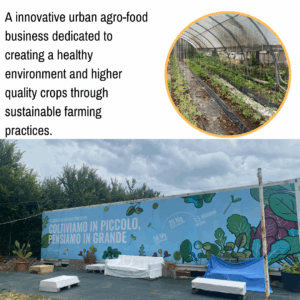Discovering best agronomic practices

Located in the heart of Scandicci, Circular Farm is an innovative urban agro-food business dedicated to creating a healthy environment and higher quality crops through sustainable farming practices.
The farm grows a wide variety of vegetables and legumes, but their most impactful project is dedicated to the cultivation of mushrooms with an approach that prioritizes urban waste management as well as a circular farming model.
At the heart of Circular Farm is their unique use of coffee grounds as a substrate for crop growth. Each day, employees make the trip to local cafes and bars to collect leftover coffee grounds that would have otherwise been discarded as waste. In total, the farm collects and recycles approximately 1.5 tonnes of coffee grounds per month, and has collected a total of nearly 200 tonnes since the project first began over a decade ago. Circular Farm recognizes that using coffee grounds as a medium for mushroom growth has benefits beyond just waste management and sustainability. In addition to the environmental positives, coffee grounds are also extremely nutrient-rich, containing specific minerals and amino acids that are key components in healthy mushrooms. This makes coffee grounds a particularly well-suited growth medium for the cultivation of high quality mushrooms, since this specific crop requires and can easily uptake the nutrients present in coffee ground substrate. Through this sustainable method, Circular Farm produces a wide variety of mushrooms including more uncommon strains such as lion’s mane and yellow or pink oyster.
Although coffee grounds are fundamental to mushroom production at Circular Farm, other sustainable techniques are also used to cultivate crops like tomatoes and peas. These plants are not grown in coffee grounds, since the nutrients they require from the soil is different than mushrooms, so the farm takes advantage of other natural forms of fertilizer to assist their growth. Coffee ground substrate that has already been used to cultivate mushrooms is transformed through earthworm vermicomposting. The earthworm feces are able to fully regenerate the exhausted substrate with time, making the coffee grounds once again available as a growth medium for new mushrooms.
The earthworms are also used as food for koi fish that have a very important purpose on the farm. The fish are kept in a pond that is connected to nearby crops through pipes; water filled with the fish’s nutrient-rich feces is then transferred to the crops through an irrigation system, which eliminates the farm’s need for most fertilizers. This method also reduces water waste because all excess water is filtered back into the koi fish pond, creating an effective closed-loop system that is good for the planet and the quality of food produced by the farm!
Circular Farm stands as a primary example of how successful sustainable farming can be, even in an urban context. Their commitment to recycling waste, using natural composting and irrigation methods, and cultivating high-quality mushrooms with coffee-grounds is a
testament to both their clever innovation and environmental stewardship, helping lead the way towards a better future for both farming practices and the planet.
Article written by Lauren Lanzilotta
